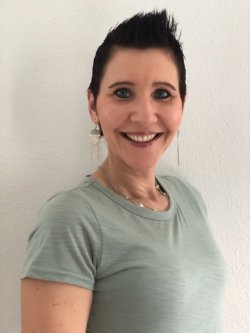Jacky on life after a cervical cancer diagnosis
Last modified: 5 June 2025, 11:15
 I began having abnormal results from my smear tests in 2013, while living in Germany, with my husband and my son. My test results showed my cells were changing and that I had HPV. The doctors kept an eye on me but I wasn’t treated for anything. After being monitored for a year, my gynaecologist and I decided it was best to have a biopsy. The procedure didn’t go very well, and I ended up staying in the hospital for 10 days because I was bleeding so much.
I began having abnormal results from my smear tests in 2013, while living in Germany, with my husband and my son. My test results showed my cells were changing and that I had HPV. The doctors kept an eye on me but I wasn’t treated for anything. After being monitored for a year, my gynaecologist and I decided it was best to have a biopsy. The procedure didn’t go very well, and I ended up staying in the hospital for 10 days because I was bleeding so much.
The results of my biopsy showed I had cervical cancer. The doctors told me it was extremely aggressive, and I needed to have an operation in the next 12 hours to save my life. I went home to pack a bag, kiss my husband and young son goodbye, and went back to the hospital for a hysterectomy and lymph node removal.
“I had cancer for basically only 24 hours”
This was so difficult to get my head around. There was no time to speak to anyone about the operation or even get second or third opinions. Plus, I had always wanted more children – my husband and I had always planned to have a large family. Suddenly, I found I had cancer for basically only 24 hours before my fertility was taken away from me.
Thankfully, all the cancer was removed but I didn’t feel like the same person afterwards. I felt like I was less of a woman now that my reproductive system was gone. It took me about a year to recover from the operation physically – I couldn’t work, hold my baby, or do jobs around the house. I needed help with everything and I wasn’t used to asking for help with anything.
“I felt totally different on the inside”
Mentally, the recovery took far longer. I developed PTSD (post-traumatic stress disorder), and my relationship with my body totally changed. I also developed body dysmorphia, where I focused on what I saw to be flaws around my mid-section where my incision had been. From the outside, I know that I appeared ‘normal’, but I felt totally different on the inside.
I was not very good at asking for help; I wanted to be strong for my son and my husband, and I wanted to recover and go back to ‘normal’. Nevertheless, I did learn to accept help from our amazing friends who pitched in. About a year after my surgery, my husband’s work required us to move to the US. I had never lived there and was so nervous. I was going to be removed from my close support system and from my doctors.
“I realised I wanted to give back more to my community”
The move was difficult and had lots of ups and downs. After settling into our new home, we really needed extra money to support my husband’s income, so I started cleaning peoples’ homes to make a bit extra. I was being recommended to more and more new clients, and it became a full-fledged cleaning business, which I found really fulfilling. I also realised I wanted to give back more to my community, so I began to partner with a non-profit called “Cleaning for a Reason”, which provides free housecleaning services to people who are receiving cancer treatment. I love being able to help people when they are going through something so incredibly difficult.
Eight years after my surgery, it’s still not always easy. It can still be really difficult to talk about or even think about sometimes – I would advise people in a similar situation to look for help. I’ve started going to therapy now, and it allows me to find a new kind of strength by understanding and accepting everything I have gone through.
“It’s OK to look and ask for help if you need it”
I feel such pride looking back on where I was 7 years ago when I was lying in a hospital bed, not knowing if I would live or die, compared to where I am now. I am stronger than ever, and I’m proud of myself for never giving up; proud of my family for their endless support; and I’m thankful to God for giving me a second chance.
Today, it’s my wish to help others by lifting them up and motivating them to keep pushing through it all. I wrote a book about my experience which I hope helps do this. I want people to see it is possible to have a full life after cancer, and that it’s OK to look and ask for help if you need it.
If you would like to speak to others who have been affected by a cervical cancer diagnosis, you can connect with others on our online Forum >

